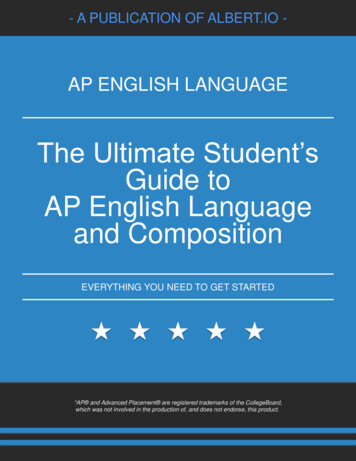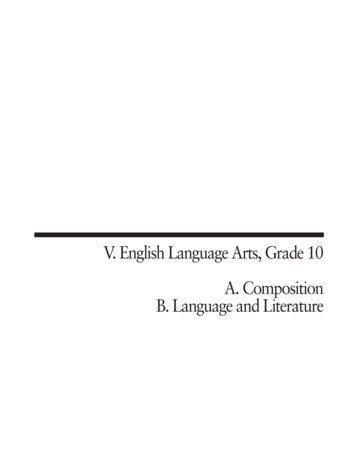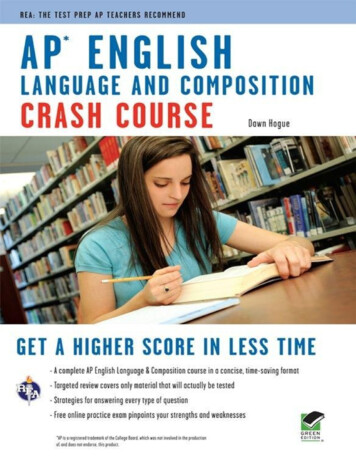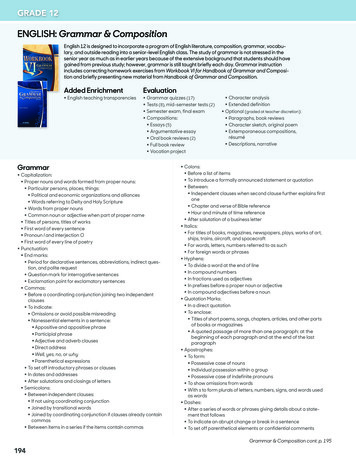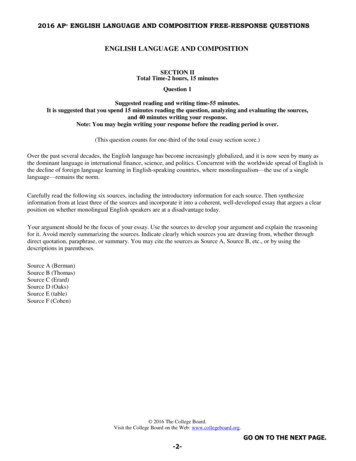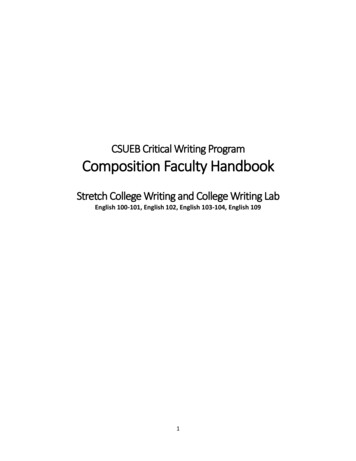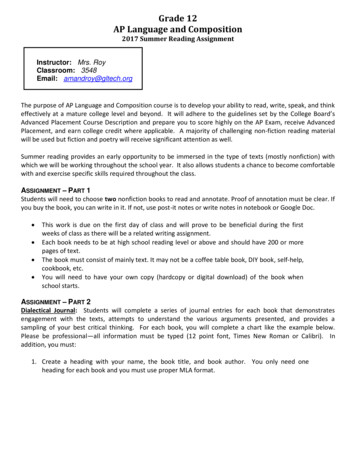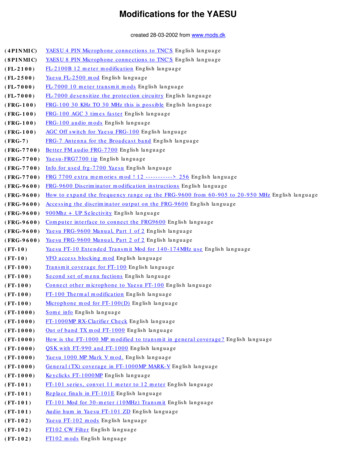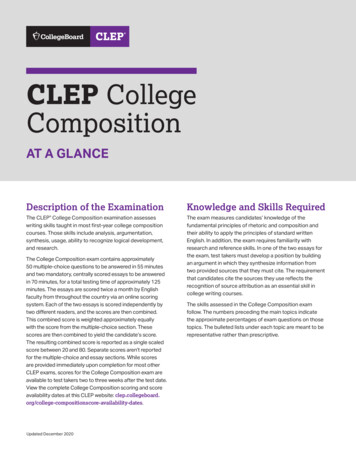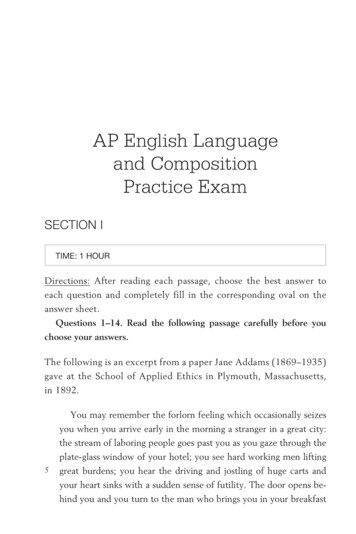
Transcription
AP English Languageand CompositionPractice ExamSECTION ITIME: 1 HOURDirections: After reading each passage, choose the best answer toeach question and completely fill in the corresponding oval on theanswer sheet.Questions 1–14. Read the following passage carefully before youchoose your answers.The following is an excerpt from a paper Jane Addams (1869–1935)gave at the School of Applied Ethics in Plymouth, Massachusetts,in 1892.You may remember the forlorn feeling which occasionally seizesyou when you arrive early in the morning a stranger in a great city:the stream of laboring people goes past you as you gaze through theplate-glass window of your hotel; you see hard working men lifting5great burdens; you hear the driving and jostling of huge carts andyour heart sinks with a sudden sense of futility. The door opens behind you and you turn to the man who brings you in your breakfast
210wait until they are older and better fitted. We intimate that socialthat you may never lose your hold on it all. A more poetic prayerobligation begins at a fixed date, forgetting that it begins at birth it-would be that the great mother breasts of our common humanity,self. We treat them as children who, with strong-growing limbs, arewith its labor and suffering and its homely comforts, may never beallowed to use their legs but not their arms, or whose legs are dailycrave because civilization has placed you apart, but you resent yourand Pestalozzi. We are fortunate in the meantime if their unusedposition with a sudden sense of snobbery. Literature is full of por-members do not weaken and disappear. They do sometimes. Theretrayals of these glimpses: they come to shipwrecked men on rafts;are a few girls who, by the time they are “educated,” forget their50girls “who haven’t playthings.” Parents are often inconsistent: theysiasm. They are not, however, confined to such moments, and if wedeliberately expose their daughters to knowledge of the distress inwere in the habit of telling them to each other, the recital would bethe world; they send them to hear missionary addresses on faminesas long as the tales of children are, when they sit down on the greenin India and China; they accompany them to lectures on the suffer55London. In addition to this, from babyhood the altruistic tendenciesring of inherited impressions, just so surely is the other the strivingof these daughters are persistently cultivated. They are taught to beof inherited powers.self-forgetting and self-sacrificing, to consider the good of the wholebefore the good of the ego. But when all this information and culture60show results, when the daughter comes back from college and beginsoutlet for active faculties.” I have seen young girls suffer and growto recognize her social claim to the “submerged tenth,” and to evincesensibly lowered in vitality in the first years after they leave school.a disposition to fulfill it, the family claim is strenuously asserted; sheIn our attempt then to give a girl pleasure and freedom from careis told that she is unjustified, ill-advised in her efforts. If she per-we succeed, for the most part, in making her pitifully miserable.sists, the family too often are injured and unhappy unless the effortsShe finds “life” so different from what she expected it to be. She65are called missionary and the religious zeal of the family carry themis besotted with innocent little ambitions, and does not understandover their sense of abuse. When this zeal does not exist, the result isthis apparent waste of herself, this elaborate preparation, if no workperplexing. It is a curious violation of what we would fain believe ais provided for her. There is a heritage of noble obligation whichfundamental law—that the final return of the deed is upon the headyoung people accept and long to perpetuate. The desire for action,of the doer. The deed is that of exclusiveness and caution, but thethe wish to right wrong and alleviate suffering haunts them daily.Society smiles at it indulgently instead of making it of value to itself.The wrong to them begins even farther back, when we restrain the40ing in Siberia; they agitate together over the forgotten region of Eastbered that they lived once before. If these childish tales are the stir-of guilt, so fatal to health and to life itself as the want of a proper35old childish desires to help the world and to play with poor littlethe presence of a great danger or when moved by a common enthu-“It is true that there is nothing after disease, indigence and a sense30carefully exercised that after a while their arms may be put to highuse. We do this in spite of the protest of the best educators, Lockegrass and confide to each other how many times they have remem-2545it would be almost grotesque to claim from him the sympathy youthey overcome the differences of an incongruous multitude when in203with a quick sense of human fellowship. You find yourself prayingwithheld from you. You turn helplessly to the waiter and feel that15AP ENGLISH LANGUAGE AND COMPOSITION PRACTICE EXAMAP ENGLISH LANGUAGE AND COMPOSITION PRACTICE EXAMfirst childish desires for “doing good,” and tell them that they must70return, instead of falling upon the head of the exclusive and cautious,falls upon a young head full of generous and unselfish plans.
41.2.The speaker in the passage can best be described as a person who is4.5.an advocate of young people’s social activism12–15) containsB.a supporter of class distinctionsA.ironyC.a critic of college educationB.paradoxD. against traditional roles for womenC.parallel syntaxE.D. abstract dictionmotivated by a desire to help the less fortunateE.The purpose of the anecdote with which the speaker begins para6.understatementThe implication of the phrase “civilization has placed you apart”A.elicit sympathy by retelling a tale of loneliness(line 14) is that the speaker and the waiterB.paint a picture of city life to fascinate her listenersA.have different professionsC.engage the audience by evoking a common experienceB.are not of the same genderD. raise questions that will be answered laterC.pursue different interestsE.D. are not of the same social classintroduce the idea of the difficulties of the laboring classE.In line 9, “it” refers to7.5The sentence beginning “You turn helplessly to the waiter” (linesA.graph 1 is to3.AP ENGLISH LANGUAGE AND COMPOSITION PRACTICE EXAMAP ENGLISH LANGUAGE AND COMPOSITION PRACTICE EXAMlack a shared perspectiveIt can be inferred when the speaker states, “literature is full of por-A.“breakfast” (line 7)B.“praying” (line 8)trayals of these glimpses” (lines 15–16) that the author is referring toC.“sense of human fellowship” (line 8)A.the “forlorn feeling” (line 1)D. “the man who brings breakfast” (line 7)B.the sinking feeling of the heart mentioned in line 6E.C.the man who brings in breakfast in line 7“a sudden sense of futility” (line 6)D. the sense of a “common humanity” (line 10)In context, “grotesque” (line 13) is best interpreted asA.condescendingB.disturbingC.ridiculousE.8.the desire for sympathy mentioned in lines 12–15The use of the subjunctive tense in lines 19–20 indicates that thetelling of the types of tales to which the speaker refersD. out of placeA.is not something we doE.B.would take a great deal of timeC.is something only children doextravagantD. requires childish confidenceE.would not take a great deal of time
69.AP ENGLISH LANGUAGE AND COMPOSITION PRACTICE EXAMAP ENGLISH LANGUAGE AND COMPOSITION PRACTICE EXAMThe first two sentences of paragraph 2 (lines 16–29) indicate13. Which one of the following characteristics of girls is emphasized inA.a continuation of the ideas expressed in paragraph 1lines 56–57?B.a change in focus from the ideas in paragraph 1A.C.a comparison of ideas with those enumerated in paragraph 1D. a direct contrast to the ideas expressed in paragraph 1E.value to itself” is best described asA.an indictment of educationB.a historical example followed by specific examplesC.a generalization followed by a conclusionD. the speaker’s reflection on her girlhoodE.a movement from the particular to the general11. The speaker employs an analogy in lines 43–46 toA. underscore her belief in the benefits of exercise for youngB.their attendance at lectures and the child-rearing practices oftheir parentsC.their humanitarian training and their parents’ desire to stiflethis trainingD. their self-abnegation and their parents’ philanthropic tendenciesE.their perseverance and their parent’s refusal to condone theiractions14. The “deed” that the speaker refers to as “that of exclusiveness andcaution” (line 69–71) is prefigured inA.“altruistic tendencies” (line 56)B.the “social claim” (line 61)C.“missionary” efforts (line 65)D. “the religious zeal of the family” (line 65)illuminate the disregard society has for children’s tendenciesE.C. emphasize the fact that society ignores the innate abilitiesof childrenD. argue that the desire of the young to help others is not cultivatedindicate her dismay at society for disregarding the advice ofeducators12. The word “educated” (line 49) is in quotation marks to indicate itsA.ironic usageB.positive effectsC.importanceD. meaninglessnessE.B.peopleto shareE.their enlightening education and their contentious relationships with parentsan application of the ideas discussed in paragraph 110. The organization of ideas in lines 28–29, “I have seen young girls lack of rigor7the “family claim” (line 62)Questions 15–30. Read the following passage carefully before youchoose your answers.The following is an excerpt from Henry David Thoreau’s essay “CivilDisobedience,” written in 1848.I HEARTILY ACCEPT the motto,—“That government is best whichgoverns least”;1 and I should like to see it acted up to more rapidlyand systematically. Carried out, it finally amounts to this, which also I1 Possible reference to “The best government is that which governs least,” mottoof the United States Magazine and Democratic Review (1837–1859), or “Theless government we have, the better” from Ralph Waldo Emerson’s “Politics”(1844), sometimes mistakenly attributed to Thomas Jefferson.
8AP ENGLISH LANGUAGE AND COMPOSITION PRACTICE EXAMAP ENGLISH LANGUAGE AND COMPOSITION PRACTICE EXAMbelieve,—“That government is best which governs not at all”; and510when men are prepared for it, that will be the kind of governmentwould fain succeed in letting one another alone; and, as has been35it. Trade and commerce, if they were not made of India rubber,3most governments are usually, and all governments are sometimes,would never manage to bounce over the obstacles which legislatorsinexpedient. The objections which have been brought against aare continually putting in their way; and, if one were to judge thesestanding army, and they are many and weighty, and deserve to pre-men wholly by the effects of their actions, and not partly by theirvail, may also at last be brought against a standing government. The40ernment itself, which is only the mode which the people have cho-But, to speak practically and as a citizen, unlike those who callsen to execute their will, is equally liable to be abused and pervertedthemselves no-government men,4 I ask for, not at once no govern-before the people can act through it. Witness the present Mexicanment, but at once a better government. Let every man make knownwar, the work of comparatively a few individuals using the standing24530what kind of government would command his respect, and that willbe one step toward obtaining it.have consented to this measure.25intentions, they would deserve to be classed and punished with thosemischievous persons who put obstructions on the railroads.government as their tool; for, in the outset, the people would not20said, when it is most expedient, the governed are most let alone bywhich they will have. Government is at best but an expedient; butstanding army is only an arm of the standing government. The gov-159After all, the practical reason why, when the power is once inThis American government—what is it but a tradition, though athe hands of the people, a majority are permitted, and for a longrecent one, endeavoring to transmit itself unimpaired to posterity,period continue, to rule, is not because they are most likely to be inbut each instant losing some of its integrity? It has not the vitality50the right, nor because this seems fairest to the minority, but becauseand force of a single living man; for a single man can bend it to histhey are physically the strongest. But a government in which the ma-will. It is a sort of wooden gun to the people themselves. But it isjority rule in all cases cannot be based on justice, even as far as mennot the less necessary for this; for the people must have some com-understand it. Can there not be a government in which majorities doplicated machinery or other, and hear its din, to satisfy that idea ofnot virtually decide right and wrong, but conscience?—in which ma-government which they have. Governments show thus how success-55jorities decide only those questions to which the rule of expediencyfully men can be imposed on, even impose on themselves, for theiris applicable? Must the citizen ever for a moment, or in the leastown advantage. It is excellent, we must all allow. Yet this govern-degree, resign his conscience to the legislator? Why has every man ament never of itself furthered any enterprise, but by the alacrity withconscience, then? I think that we should be men first, and subjects af-which it got out of its way. It does not keep the country free. It doesterward. It is not desirable to cultivate a respect for the law, so muchnot settle the West. It does not educate. The character inherent in60as for the right. The only obligation which I have a right to assume isthe American people has done all that has been accomplished; and itto do at any time what I think right. It is truly enough said that a cor-would have done somewhat more, if the government had not some-poration has no conscience; but a corporation of conscientious mentimes got in its way. For government is an expedient by which men3 Made from the latex of tropical plants; “India” because it came from the2 U.S.-Mexican War (1846–1848), considered by abolitionists to be aneffort to extend slavery into former Mexican territory.West Indies, and “rubber” from its early use as an eraser.4Anarchists, many of whom came from Massachusetts.
106511is a corporation with a conscience. Law never made men a whit more17. In lines 11–16, the author draws a connection between the “stand-just; and, by means of their respect for it, even the well-disposed areing government” and the “standing army” (lines 10–11) to argue thatdaily made the agents of injustice. A common and natural result ofthe army and the governmentan undue respect for law is, that you may see a file of soldiers, colo-I.are only aspects of a wholein admirable order over hill and dale to the wars, against their wills,II.can be distorted and mistreateday, against their common sense and consciences, which makes it veryIII. are manipulated by a minoritynel, captain, corporal, privates, powder-monkeys,5 and all, marching70AP ENGLISH LANGUAGE AND COMPOSITION PRACTICE EXAMAP ENGLISH LANGUAGE AND COMPOSITION PRACTICE EXAMsteep marching indeed, and produces a palpitation of the heart. Theyhave no doubt that it is a damnable business in which they are concerned; they are all peaceably inclined. Now, what are they? Menat all? Or small movable forts and magazines, at the service of someunscrupulous man in power?5Boys who carry gunpowder for soldiers.15. This essay could best be characterized asA.I onlyB.II onlyC.III onlyD. II and III onlyE.I, II, and III18. Footnote 2 serves to do all of the following exceptA.justify America’s participation in the Mexican-American WarA.a diatribe against the governmentB.explain why the author and others did not support the warB.an abolitionist speechC.provide insight into the abolitionist causeC.a citizen’s call to actionD. supply the dates of the Mexican-American WarD. an anarchist’s desire for changeE.a conservative’s words of praise16. The dominant rhetorical device in line 4 isE.suggest a possible outcome of the Mexican-American conflict19. The “American government” (line 18) is juxtaposed to “a singleliving man” (line 21) to argue that the government is all of theA.oxymoronfollowing exceptB.parallel structureA.moribundC.paradoxB.easily manipulatedD. inverted syntaxC.ineffectualE.D. without real powercatalogueE.without energy
12AP ENGLISH LANGUAGE AND COMPOSITION PRACTICE EXAMAP ENGLISH LANGUAGE AND COMPOSITION PRACTICE EXAM20. In line 22, “wooden gun” is24. The author compares “trade and commerce” to “India rubber” (lineA.metonymy for war36) to make the point that legislatorsB.synecdoche for firearmsA.C.a metaphor for lack of powerD. an analogy comparing guns to toysE.pectations of government is that government must beA.convoluted yet quietB.mechanistic yet calmC.robotic and disturbingD. intricate and noisyE.complex and alarming22. “Yet this government out of its way” (lines 27–29) means thatA.the government helps itself by helping people’s business venturesB.the government helps people progress through its supportand effortC.B.C.E.D. negotiate trade and commerce agreements but then knowinglysabotage themE.23. Lines 29–30 use which rhetorical device and for what purpose?establish difficulties to trade that only India rubber commercecan navigate25. The analogy in lines 38–41 not only emphasizes the comparison inline 36 but alsoA.points out the danger and injudiciousness of legislators’ actionsB.creates a contradiction between legislators’ desired results andmisguided choicesC.reveals why legislators engage in illegal activities regardingtrade and commerceD. distinguishes between the men themselves and their actionsand intentionsE.a slow and well-thought-out governmental response leads tothe success of the peopleinstigate trade and commerce agreements but then block theirsuccessful completionD. forcefully inserting itself into the activities of its people helpsthem to succeedcreate impediments that trade and commerce are fortunatelyable to overcomequickly removing itself from the path of the people is the onlyhelp the government can offerresearch how to use India rubber as a commodity to overcometrade and commerce issuesan oxymoron providing a truth21. In lines 22–24, the author’s point about “the people” and their ex-illuminates how the achievements of legislators are not alwaysa result of their actions26. Footnote 4 serves toA.identify where the majority of anarchists resideA.polysyndeton to reveal the qualities of the American peopleB.define what an anarchist isB.asyndeton to underscore why the American people shouldC.differentiate the author from anarchistsbe proudD. explain to whom the author refersallusion to refer to America’s recent historical pastE.C.D. abstract diction to create ambiguity about American achievementsE.anaphora to emphasize what the government has not done13clarify the actions of “no government” men
14AP ENGLISH LANGUAGE AND COMPOSITION PRACTICE EXAMAP ENGLISH LANGUAGE AND COMPOSITION PRACTICE EXAM27. The rhetorical device used in lines 43–44, “I ask for, not no govern-Questions 31–43: Read the following passage carefully beforement, but at once a better government” isA.chiasmusB.antithesisC.idiomatic languageyou choose your answers.The following is an excerpt from a contemporary magazine.On March 23, 2010, President Barack Obama signed the PatientD. inversionE.Protection and Affordable Care Act into law. This law will suppos-a loose sentenceedly make health insurance more affordable by providing tax cutsto small businesses that offer their employees coverage. It will also28. The author’s point regarding majority rule (lines 53–56) is that themajority should ruleA.only on matters devoid of moral claimsB.when the issue entails matters of fairnessC.during circumstances that include justice to the minorityD. when the situation revolves around matters of right and wrongE.if practical considerations are at least one aspect of the ruling5two million Americans receive coverage. In addition, the government estimates that the act will reduce the deficit by 100 billion ina decade. While these reforms seem like positive steps in the right10B.to be a subject entails abiding by the precepts of one’s conscienceC.individual conscience is more important than the lawincluded the loss of a public health insurance option sponsored bythe government. Critics of the public option equated governmenthealth insurance with socialism, claiming that such a plan would15dustry. If a government option made health care more affordableand provided more people with coverage, then who would chooseit is the duty of conscience to obey the laws of legislators30. The author’s tone in the passage as a whole is best described asA.warmly sympatheticB.harshly criticalC.unquestioningly supportivemore expensive coverage provided by private insurers? This was ex20insightfully creativeactly the point that those interested in real reform were trying tomake. While capitalist-loving politicians saw this as a threat to theextremely lucrative health care industry (an industry representedby many special interest groups on Capitol Hill), they failed torecognize the fact that a public option would force private insur-D. staunchly judgmentalE.not only expand the government’s control over individual liberties,but also would destroy competition within the health insurance in-D. men have consciences as reflected in the morality of legislatorsE.direction, the act is still shrouded in controversy.This much-maligned bill passed only after several revisions, whichstated asconscience should be subservient to the lawprovide tax credits to individuals who purchase their own healthinsurance. Supporters of the act believe it will help nearly thirty-29. The author’s point regarding conscience in lines 57–63 is bestA.1525ance companies to lower prices to compete with the government.The public option was not government-mandated health care; itwas merely another option.According to a 2010 report issued by the Centers for Disease
16Control (CDC), an estimated fifty-nine million Americans are still30without health insurance—and this number rose when millions ofAmericans lost their jobs due to the poor economy. While the Patient Protection and Affordable Care Act could help to reduce thisnumber significantly, it does not do enough to help the millions ofAmericans who are without health insurance. The high cost of care35AP ENGLISH LANGUAGE AND COMPOSITION PRACTICE EXAMAP ENGLISH LANGUAGE AND COMPOSITION PRACTICE EXAMnot only keeps people away from the doctor when they are sick, butalso stops them from seeking preventative care. This practice is likelyto continue if the government does not figure out a way to providehealth insurance to those who need it most.31. The author of the passage can best be described as someone whoA.believes that the health care act should be repealedB.feels that the government has too much control over people’slivesC.receive the coverage they need, the current law includes an individual mandate, which is not active until 2014, that would require allD. hopes that private insurance companies will not work withthe governmentE.32. The author’s choice of the word “supposedly”(lines 2–3)A.B.implies that the author does not believe the act will accomplish its goalsmission to repeal the act altogether. While this is a drastic, unneces-C.sary move that would most likely set the entire health care reformD. indicates that the author does not want the Republicans tomovement back to square one, it is also an opportunity to discussproblems with the current law. One of these discussions should putexposes the author’s bias against the Obama administrationrepeal the actE.the public option back on the table and find a way to ensure that all50shows the author’s disdain for government-mandated healthreformAfter the midterm elections of 2010, Republicans made it their45thinks that the government is not doing enough to reform thehealth care systemAmericans to purchase coverage or face a fine. This course of action,however, is like pouring salt in an already gaping wound.wants the government to better regulate private insurancecompaniesInstead of a public option that would help the poorest Americans4017reflects the author’s frustration with the private insurancecompaniesAmericans have access to affordable health care.33. The antecedent to the pronoun “it” in line 4 isA.the governmentB.the lawC.tax creditsD. small businessesE.health insurance
18AP ENGLISH LANGUAGE AND COMPOSITION PRACTICE EXAMAP ENGLISH LANGUAGE AND COMPOSITION PRACTICE EXAM34. Lines 1–9 of the essayA.B.C.government private insurers?”)?and Affordable Care ActA.metaphorcriticize Republican efforts to repeal the Protection and Af-B.juxtapositionfordable Care ActC.catalogueprovide background information on the Protection and Af-D. sarcasmfordable Care ActE.reduce the deficitE.37. Which of the following does the author employ in lines 18–20 (“If aexplain why the public option was taken out of the ProtectionD. describe how the Protection and Affordable Care Act willreveal the problems with the Protection and Affordable CareAct35. Which of the following best describes the shift from paragraph 1 toparagraph 2?A.a shift in the author’s toneB.a shift in the author’s point of viewC.a shift from opinion to facta shift specific to generalHill”) suggests that the authorA.feels that the health care industry is too important to theeconomy to failB.thinks that politicians are more concerned about people thanmoneyC.wants politicians to listen to representatives from the healthcare industryD. thinks that the health care industry should lobby politicians toimprove the systemE.believes politicians are influenced by special interest groupsfrom the health care industry36. The comparison of “government health care” to “socialism” in lines14–15 implies thatrhetorical question38. In lines 23–24, the phrase in parentheses (“an industry CapitolD. a shift from definition to exampleE.39. The facts in lines 29–32 (“According to a 2010 report poor econ-A.the pubic option would have helped many peopleomy”) could best be described as all of the following exceptB.politicians believed the public option was importantA.disappointingC.politicians wanted to salvage a public optionB.logicalD. the public option was anticapitalistC.ironicE.D. criticalthe public option was too complicated19E.disturbing
20AP ENGLISH LANGUAGE AND COMPOSITION PRACTICE EXAMAP ENGLISH LANGUAGE AND COMPOSITION PRACTICE EXAM40. The dominant rhetorical strategy used in paragraph 3 isA.anecdoteB.paradoxC.anaphora43. The phrase “back to square one” (line 48) refers to the time beforeA.irony41. The author’s use of the phrase “like pouring salt in an already gapingwound” suggests that the author views the individual mandate asA.detrimentalB.advantageousC.embarrassingD. necessaryE.exclusive42. Which of the following cannot be inferred from the information inlines 45–51?A.The author feels that repealing the act would harm the healthcare reform movement.B.The author wants politicians to discuss reforming the act toinclude a public option.C.The author wants all Americans to have access to affordablehealth care.D. The author does not believe that the public option will helppeople.E.The author does not believe that the act should be repealed.the public option was dropped from the Patient Protection andAffordable Care ActB.D. logosE.21the Patient Protection and Affordable Care Act was signedinto lawC.there was any health insurance offered in the United StatesD. the mid-term elections were heldE.the economy took a downturn
22AP ENGLISH LANGUAGE AND COMPOSITION PRACTICE EXAMSECTION IITOTAL TIME: 2 HOURSAP ENGLISH LANGUAGE AND COMPOSITION PRACTICE EXAM23 Source C (Fiorello La Guardia) Source D (Hayti Herald) Source E (Delle M. Mason)QUESTION 1 Source F (Political Cartoon)suggested reading time—15 minutessuggested writing time—40 minutesThis question counts for one-third of the total essay section.Source AOn January 16, 1919, the Eighteenth Amendment of the UnitedDirections: The following prompt is based on the accompanying sixStates Constitution, along with the Volstead Act (which definedsources. This question requires you to synthesize a variety of sources“intoxicating liquors” excluding those used for religious purposesinto a coherent and well-written essay. When you synthesize sources,and sales throughout the United States), established Prohibitionyou include them to develop your position and cite them accurately.in the United States.Your position should be central; the sources should support your position.Avoid merely summarizing or paraphrasing the sources. Remember to citeSection 1. After one year from the ratification of this article the manu-both direct and indirect references to the sources.facture, sale, or transportation of intoxicating liquors within, the importation thereof into, or the exportation thereof from the United StatesINTRODUCTIONand all territory subject to the jurisdiction thereof for beverage purposesProhibition in the United States was also known as “The Noble Experi-is hereby prohibited.ment.” As a result of the Eighteenth Amendment, from 1920 to 1933the sale, manufacture, and transportation of alcohol for consumptionSection 2. The Congress and the several States shall have concurrentwere banned nationally. Many believed outlawing alcohol would resultpower to enforce this article by appropriate legislation.in a better society for all.Section 3. This article shall be inoperative unless it shall have been rati-ASSIGNMENTfied as an amendment to the Constitution by the legislatures of the sev-Read the following six sources carefully, including the introductory in-eral States, as provided in the Constitution, within seven years from theform
6 AP ENGLISH LANGUAGE AND COMPOSITION PRACTICE EXAM AP ENGLISH LANGUAGE AND COMPOSITION PRACTICE EXAM 7 9. The first two sentences of paragraph 2 (lines 16-29) indicate A. a continuation of the ideas expressed in paragraph 1 B. a change in focus from the ideas in paragraph 1 C. a comparison of ideas with those enumerated in paragraph 1
